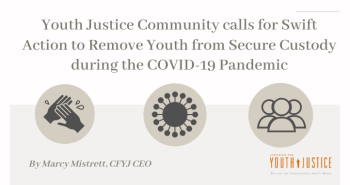Youth Justice Community calls for Swift Action to Remove Youth from Secure Custody during the COVID-19 Pandemic

By Marcy Mistrett, CFYJ CEO
Last week, the youth justice community called on governors, the federal government, local legislators, and juvenile justice department leaders to remove children from secure custody and reunite them with family members during the COVID-19 pandemic. Given the Center for Disease Control’s (CDC) recommendations for social distancing and frequent hand washing with soap and water, that are nearly impossible to implement in secure settings, along with many local juvenile justice and correctional responses to end visitation and programming from external volunteers to slow the spread of COVID-19, youth in correctional settings remain at high risk of contracting the illness--particularly those youth with underlying medical conditions such as asthma, and immunosuppressive illnesses. Young people housed in adult facilities face particularly difficult conditions. Furthermore, as facilities decide to end in-person family visits, as schools close (including those in correctional settings), and volunteer programming is reduced or stopped—stressors on children in custody will increase. Communication on what protective measures are taking place in facilities and community supervision is essential and must be clear and frequent between juvenile justice staff, young people and families.
In partnership with many other national and state advocacy groups and membership associations, CFYJ is taking action to protect youth in contact with the justice system during this unprecedented time:
- Act-4-JJ issued a statement and action alert on Tuesday to Congressional members, urging them to include testing, treatment and prevention measures in secure facilities, access to remote learning, free contact with families via technology, and ensuring children’s civil rights are protected.
- The National Juvenile Justice Network and Coalition for Juvenile Justice hosted a webinar with nearly 700 participants, outlining steps that juvenile justice agencies and advocates can take to protect children in their care. A list of partner resources and actions is available on their website.
- Supported Youth First Initiative’s state collective action on Thursday, where 22 states called on their local governments to release children in custody, and protect those youth and workers who remain in secure care.
- Joined the Justice Roundtable’s call on Congress on Wednesday to include protections for incarcerated youth and adults in the third stimulus package.
- Planning twitter chats to keep the field up to date on system responses and shared advocacy tools Thursday, March 26th at 2pm EST.
In addition, we applaud the efforts of many of our partner membership associations for taking swift action to protect children, including:
- The National Partnership on Juvenile Services that hosted a call on Friday to coordinate local detention, probation and supervision responses; with trauma-informed care undergirding many of the responses, in recognition that this pandemic is going to take a mental toll on many of our children, particularly those in custody. A list of tools, actions, and statements from their members can be found here.
- The Law Enforcement Action Partnership hosted a call on Thursday, calling on law enforcement to limit contacts, stops and warrant enforcement to instances where there is imminent concern for public safety; maximize cite and release and utilize civil citations; to decline or delay prosecution for low level offenses, offering bail, and default to non custodial sentences where possible; and work with other court players to release people from jail where safely possible including vulnerable populations and those with less than 90 days remaining on their time; and finally to stop office visits for probation, suspend technical violations during the coronavirus crisis; and speed up compassionate release cases.
- The Youth Correctional Leaders for Justice issued a statement calling for the release of youth in custody, reduction of youth contact with the justice system by coordinating with courts, prosecutors and police, creating of emergency plans in custodial settings, eliminating fines and fees.
- The National Juvenile Defender Center has collected a list of statements, motions, and affidavits for juvenile defenders to use to support the release and safety of children in custody.
- Fair and Just Prosecution issued a statement with 30 prosecutors that calls on prosecutors to reduce detention and incarceration during COVID-19, ensure humane conditions of confinement (including due process), protecting immigrant communities and reducing immigrant detention, and ensuring appropriate health care measures and protections for confined people.
- The Illinois Juvenile Justice Initiative urged the immediate adoption of two basic international human rights protections for all children and young adults in conflict with the law – end detention of children under the age of 14 and end incarceration for low level property and technical violations.
- Physicians for Criminal Justice Reform issued a statement calling for the reduction of youth in secure placement, halting new admissions, and ensuring secure placements are following good prevention and emergency planning.
Nationally as we continue to monitor and respond to this public health crisis, CFYJ will continue to keep you updated. We urge those of you who are in a position to do so to reach out to local organizations who serve youth who come in contact with the law, and see what their immediate needs are and support them where possible. We know youth and their families may be vulnerable to job loss, housing, and food insecurity, and may not have access to e-learning, or basic necessities such as diapers and formula. We encourage efforts to support these programs as risks increase, and “shelter in place” calls increase.
In closing, we encourage everyone to take care of one another, to take time to breathe (fresh air when possible!), and to remember those who aren’t able to be with their loved ones through this pandemic.
We remain, in solidarity.

